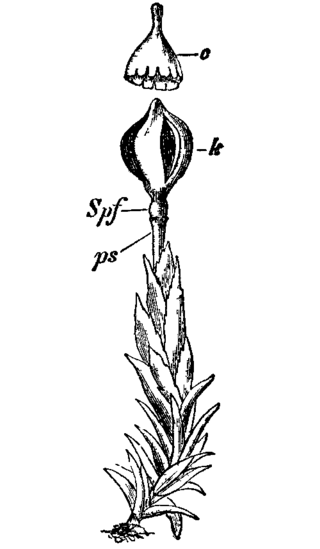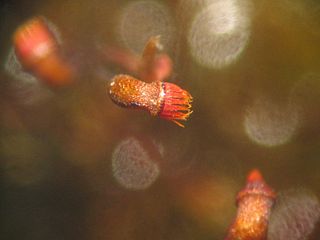| Hypnodendrales | |
|---|---|
 | |
| Hypnodendron comosum | |
| Scientific classification | |
| Kingdom: | Plantae |
| Division: | Bryophyta |
| Class: | Bryopsida |
| Subclass: | Bryidae |
| Superorder: | Hypnanae |
| Order: | Hypnodendrales N.E.Bell, A.E.Newton & D.Quandt |
| Families | |
See Classification | |
| Hypnodendrales | |
|---|---|
 | |
| Hypnodendron comosum | |
| Scientific classification | |
| Kingdom: | Plantae |
| Division: | Bryophyta |
| Class: | Bryopsida |
| Subclass: | Bryidae |
| Superorder: | Hypnanae |
| Order: | Hypnodendrales N.E.Bell, A.E.Newton & D.Quandt |
| Families | |
See Classification | |
Species in the order are robust pleurocarpous mosses that are epiphytic. They are generally characterized by basally reiterating stems or stipes with secondary branching towards the apex. The order is mostly restricted to the Southern Hemisphere. [2]
There are four families placed in the Hypnodendrales:

Andreaeaceae is a family of mosses which includes two genera, Andreaea, containing about 100 species, and the genus Acroschisma. The Andreaeaceae prefer rocky habitats ranging from tropical to arctic climates, on which they form tufted colonies, typically with reddish to blackish shoots. The capsules lack the peristome mechanism and dehisce longitudinally to release the spores, resulting in a paper-lantern appearance.

The Bryopsida constitute the largest class of mosses, containing 95% of all moss species. It consists of approximately 11,500 species, common throughout the whole world.

Bryidae is an important subclass of Bryopsida. It is common throughout the whole world. Members have a double peristome with alternating tooth segments.

Funariales is an order containing 356 species,26 genera and 7 families.

Grimmiales is an order of mosses in the subclass Dicranidae. It comprises four families: Grimmiaceae, Ptychomitriaceae, Seligeriaceae, and Saelaniaceae.

Sphagnopsida is a class of mosses that includes a single subclass Sphagnidae, with two orders. It is estimated it originated about 465 million years ago, along with Takakia. The order Sphagnales contains four living genera: Ambuchanania, Eosphagnum, and Flatbergium, which counts four species in total, and Sphagnum which contains the rest of the species. The extinct Protosphagnales contains a single fossil species.

Pottiales is an order of mosses in the subclass Dicranidae.
Andreaeobryum, the Mossy Cowl Moss, is a genus of moss with a single species Andreaeobryum macrosporum, endemic to Alaska and western Canada. The genus is placed as a separate family, order and class among the mosses.

Bryales is an order of mosses.
Gigaspermaceae are a family of mosses in the monotypic order Gigaspermales. The order is placed in subclass Gigaspermidae of the class Bryopsida. They were previously placed in subclass Funariidae.

Encalyptales is an order of mosses in subclass Funariidae. It contains a single family.

Timmia is a genus of moss. It is the only genus in the family Timmiaceae and order Timmiales. The genus is named in honor of the 18th-century German botanist Joachim Christian Timm.

Dicranales is an order of haplolepideous mosses in the subclass Dicranidae.

Fissidentaceae is a family of haplolepideous mosses (Dicranidae) in the order Dicranales, with a single genus, Fissidens. It was formerly placed in the now-obsolete order Fissidentales.

Bryaceae is a family of mosses.
Daltoniaceae is a family of moss in the order Hookeriales.

Bartramiales is an order of moss.

Mniaceae is a moss family in the order Bryales.
Rhachitheciaceae is a family of haplolepideous mosses (Dicranidae)s in the order Dicranales. It consists of seven genera.
William Russel Buck is an American bryologist.